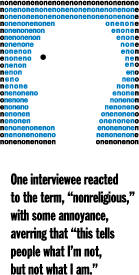|
|
|
|
SYMPOSIUM ARTICLES: Läicité and Secular Attitudes in France Secularism: The Case of Denmark The Secular Israeli Jewish Identity Secularism in Iran: a Hidden Agenda?
|
Understanding American "Nots"
There has been less direct or detailed attention focused on those who might be characterized as the “quintessential seculars”—the substantially or affirmatively non-transcendental, or “nots.” These are people who do not think or behave as though there is an immaterial reality apart from, beyond, or interlaced within material existence and its properties. Such individuals • eschew theistic, transcendental, or super-natural ideas or worldviews, • do not identify with “traditions” or institutions that embrace such worldviews, but • may hold alternative worldviews (e.g., naturalistic or non-transcendental), or • may be profoundly indifferent to “ultimate” or metaphysical questions or concerns, and • substantially avoid public or private behavior that reflects transcendental ideas (prayer, worship, incantation or conjuring, interaction with spirits, and so on).
This includes, but is by no means restricted to “atheists” or “agnostics.” There is a widespread tendency to refer to “nots” as such, but many, perhaps most, avoid these terms as identity labels or self-descriptions since they are politically charged, ambiguous, incomplete, or misleading.
Most “nots” are unaffiliated with organizations that embrace or advocate non-transcendental philosophies. They are not conveniently assembled on the basis of their worldviews. Their numbers are not great enough to make national surveys a particularly efficient method for research. And so, we don’t really know that much about them. I have been taking a close look in a limited geographical region—the American Northwest—using a variety of methods, including participant observation, in-depth interviews, meeting attendance, and survey research. Existing data suggest that there are at least one-half million “nots” in Oregon and Washington, alone. Prevailing thought has tended to collapse the “nots” into an indistinguishable mass. Upon closer inspection, there is considerable diversity. Many use a variety of terms to describe themselves, such as skeptic, unbeliever, nonbeliever, irreligious, nonreligious, secular, humanist, agnostic, rationalist, freethinker, atheist, naturalist, non-transcendentalist, empiricist, and the recently coined “brights.” Others shy from pat labels, preferring rich descriptions of their worldviews. One interviewee reacted to the term, “nonreligious,” with some annoyance, averring that “this tells people what I’m not, but not what I am.” A small minority of affiliated “nots” may be found in a variety of nonreligious organizations that address a range of interests and sensibilities. The majority tends to affiliate on the basis of specific interests and social causes as concerned, rather than irreligious, citizens. Both exhibit what I call “social skepticism”—preoccupation with the destructive power of uncritical group participation or blind group immersion. This is not mere “individualism,” but rather, a conscious and deliberate effort to manage when, where, and to what extent they contribute their support to the power and activities of groups and institutions. While many affiliated “nots” tend to focus greater attention on the role of “religion” in fostering “blind group immersion” that can have destructive consequences, unaffiliated “nots” are often equally critical of ideological or doctrinal “group-think”—whether religious or irreligious. I am finding that the “religious-secular” frame fails to capture and reflect the range of worldviews emerging in interviews. Apart from thoroughgoing “atheists,” “freethinkers,” or “secular humanists,” among my interviewees have been: • a nonreligious skeptic who participates without belief with other women in “pagan-like” celebrations of life and nature for the “color and connectivity” they offer, • an intensely anti-religious atheist who engages in group Buddhist meditation and yoga as “therapy” (sans “transcendental beliefs”), and • a skeptical and scientific empiricist who uses samsara and karma “metaphorically” (without belief in their ontological reality) to frame and guide his approach to everyday life and ethical choices.
These are substantially and affirmatively non-transcendental people. Too much information is lost when they are shunted, survey-wise, into “religious” or “non-religious,” “spiritual” or “secular.” Many struggle to articulate experiences of awe, “connection,” or “free-floating gratitude.” But they are reluctant to do so in the language of “spiritual/ity” for fear of conveying supernatural or transcendental meanings. We are in need of a new and more nuanced vocabulary, both in the social sciences and the popular sphere, that better reflects the many ways human beings grapple with the basic questions and experience of human existence. Upon closer inspection, it becomes clear that there is a much richer mosaic of approaches to existential and meta-physical wondering (and related behavior) than has been afforded by the religious-secular frame—even among the “nots.” |

 There
is a good deal of talk about “nones” these days. This has become a
well-established category in survey research on religion (or its absence).
It refers to individuals who do not choose or volunteer a specific religious
affiliation or identification or who state “no religious preference” or “no
religion” when prompted. It is a function of survey method rather than a
self-description and encompasses a wide range of types, from “atheists or
agnostics” to the “unchurched religious.” In fact, most “nones” report
selected religious beliefs and behavior. As such, the category offers
suggestive or directional insights into the comparatively less religious,
but not specific data on those who are substantially or affirmatively
nonreligious in belief, behavior, or identity.
There
is a good deal of talk about “nones” these days. This has become a
well-established category in survey research on religion (or its absence).
It refers to individuals who do not choose or volunteer a specific religious
affiliation or identification or who state “no religious preference” or “no
religion” when prompted. It is a function of survey method rather than a
self-description and encompasses a wide range of types, from “atheists or
agnostics” to the “unchurched religious.” In fact, most “nones” report
selected religious beliefs and behavior. As such, the category offers
suggestive or directional insights into the comparatively less religious,
but not specific data on those who are substantially or affirmatively
nonreligious in belief, behavior, or identity.